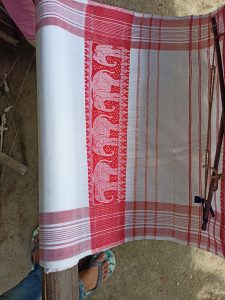Guwahati, Oct 12: In its unrelenting quest for facilitating human elephant coexistence (HEC) with community support in eastern Assam districts, premier biodiversity conservation organisation Aaranyak (www.aaranyak.org) has launched an initiative to provide high-quality yarn assistance as well as training to women handloom weavers from the community.
The Aaranyak in collaboration with British Asian Trust and with support from Darwin Initiative has so far provided high-quality yarn to weavers from over 200 households in eastern Assam districts of Jorhat (40 households), Sivasagar (43), Majuli (60), Dibrugarh (48) and Tinsukia (12) so as to supplement the average household income.
By ensuring a steady supply of yarn, Aaranyak aims to contribute to the sustainable livelihoods of these handloom weavers, enabling them to earn a decent income as well as preserve the traditional craft of handloom weaving in in eastern Assam districts especially Majuli which is renowned for enchanting traditional handloom products weaved by tribal weavers in the river island district.
In pursuit of its goal to add value to the handloom products in those human-elephant interface affected areas in Eastern Assam, Aaranyak had adopted a two-pronged strategy of providing high-quality yarn as well as advanced trading to women handloom weavers.
Sixty-five weavers from Jorhat district , 68 from Sivasagar district, 71 from Majuli district, 65 from Dibugarh district and 11 from Tinsukia district have been provided training till date to help them improve the quality of their products.
Each of these weavers were provided with 5 kgs of high-quality yarn each. The average monthly income of the households where these weavers belong, is around Rs 5000. Training was provided for 11 days in total to weavers across these five districts. The master trainer engaged by Aaranyak was Nandeswar Deka.
Majuli, the largest inhabited river island in the world, is known for its rich cultural heritage, including its handloom weaving tradition which is a significant occupation for many inhabitants of Majuli, particularly the Mishing tribe. However, weavers in the region have faced several challenges, including limited access to raw materials such as yarn.
Rina Doley (22) of Majuli is one of the weavers who have benefited from Aaranyak’s initiative. Her family has seven members and possesses only two bighas of land. The annual income of her family is approximately Rs 70,000.
Agriculture was Rina’s prime source of livelihood before she was picked by Aaranyak for support. Though she was into weaving, the products were meant for only family members. After getting 5kg of yarn support from Aaranyak, Rina Doley weaved two pairs of Chadar and Makhela (Assamese women traditional dress) and sold them for Rs 2000 per pair. With this money she bought essentials and books for her children.
“Handloom weaving has been a traditional occupation in our region for generations. It involves weaving intricate designs and patterns using yarn to create beautiful fabrics. However, as traditional as it may be, the handloom sector is facing numerous challenges today. The lack of access to quality yarn, high production costs, and limited market opportunities are some of the major hurdles we face,” Rona Doley said adding the yarn support from Aaranyak has been a significant game-changer for the weavers in our community as it has provided us access to high-quality yarn, which makes a huge difference in the quality and durability of our handloom products. This, in turn, has increased the value and market demand for our handloom fabrics.
She also commented that the yarn support has been instrumental for the weavers to add diversity to their product range. Aaranyak has not only provided the weavers with high-quality yarns but also exposed them to various eco-friendly and natural fibres. This has allowed them to create sustainable products that attract a wider customer base.
Aaranyak has facilitated training by experienced textile experts to help weavers improve their weaving techniques and introduce new designs. This has gone a long way to improve the weavers’ livelihood by supplementing their average income. As the income level of the weavers has significantly increased, they are now able to support their families better and invest in the education and healthcare of their children.
In tune with its endeavour to facilitate conservation of elephants, Aaranyak has encouraged some of these weavers from Majuli to weave gamosas with elephant motifs to highlight the importance of the giant animal in our ecosystem.




